marine pollution海洋污染 英文版
海水污染英语作文120词
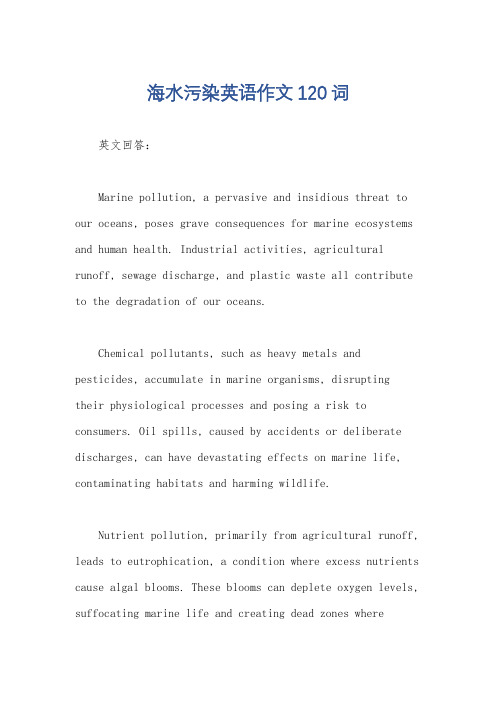
海水污染英语作文120词英文回答:Marine pollution, a pervasive and insidious threat to our oceans, poses grave consequences for marine ecosystems and human health. Industrial activities, agricultural runoff, sewage discharge, and plastic waste all contribute to the degradation of our oceans.Chemical pollutants, such as heavy metals and pesticides, accumulate in marine organisms, disruptingtheir physiological processes and posing a risk to consumers. Oil spills, caused by accidents or deliberate discharges, can have devastating effects on marine life, contaminating habitats and harming wildlife.Nutrient pollution, primarily from agricultural runoff, leads to eutrophication, a condition where excess nutrients cause algal blooms. These blooms can deplete oxygen levels, suffocating marine life and creating dead zones whereaquatic organisms cannot survive.Plastic pollution is perhaps the most visible and widespread form of marine pollution. Plastic debris entangles marine animals, harms their digestive systems,and accumulates in the food chain. Microplastics, tiny pieces of plastic, are even being found in marine organisms at the base of the food chain.Marine pollution poses significant risks to human health. Consumption of contaminated seafood can lead to poisoning and health issues. Harmful algal blooms can produce toxins that threaten the health of shellfish consumers and those who swim in polluted waters.Addressing marine pollution requires a comprehensive approach involving governments, industries, and individuals. Reducing industrial emissions, improving agricultural practices, and implementing effective waste management systems are crucial steps towards mitigating this problem.中文回答:海水污染。
海洋污染 英语作文
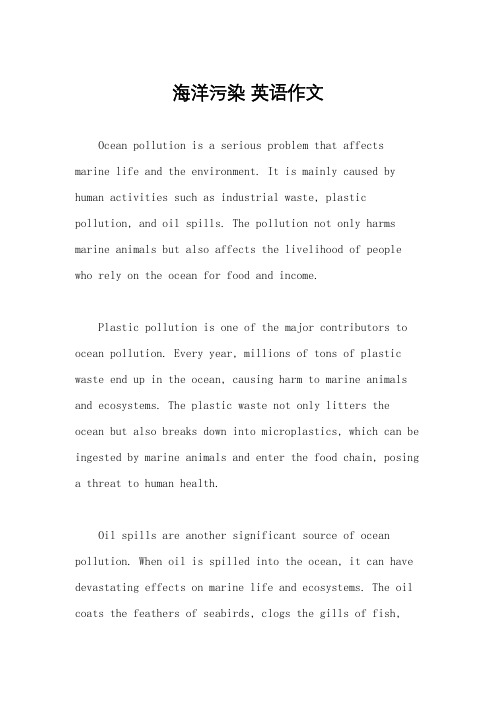
海洋污染英语作文Ocean pollution is a serious problem that affects marine life and the environment. It is mainly caused by human activities such as industrial waste, plastic pollution, and oil spills. The pollution not only harms marine animals but also affects the livelihood of people who rely on the ocean for food and income.Plastic pollution is one of the major contributors to ocean pollution. Every year, millions of tons of plastic waste end up in the ocean, causing harm to marine animals and ecosystems. The plastic waste not only litters the ocean but also breaks down into microplastics, which can be ingested by marine animals and enter the food chain, posing a threat to human health.Oil spills are another significant source of ocean pollution. When oil is spilled into the ocean, it can have devastating effects on marine life and ecosystems. The oil coats the feathers of seabirds, clogs the gills of fish,and smothers the habitats of marine animals. It can take years for the ecosystem to recover from an oil spill, and some effects may be irreversible.Industrial waste, including chemicals and heavy metals, also contributes to ocean pollution. These pollutants can contaminate the water and harm marine life. They can also accumulate in the tissues of marine animals, posing a riskto human health when consumed.The impact of ocean pollution is far-reaching and requires immediate action to address. Governments, industries, and individuals all have a role to play in reducing ocean pollution. Efforts to reduce plastic waste, improve waste management, and enforce regulations on industrial waste disposal are crucial steps in combating ocean pollution.In conclusion, ocean pollution is a pressing issue that requires collective action to address. By raising awareness, implementing regulations, and changing our consumptionhabits, we can work towards a cleaner and healthier ocean for future generations.。
海洋污染的英文作文
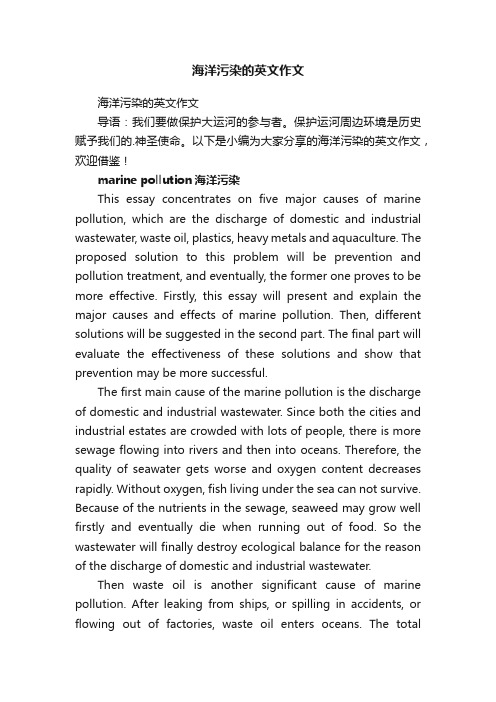
海洋污染的英文作文海洋污染的英文作文导语:我们要做保护大运河的参与者。
保护运河周边环境是历史赋予我们的.神圣使命。
以下是小编为大家分享的海洋污染的英文作文,欢迎借鉴!marine pollution海洋污染This essay concentrates on five major causes of marine pollution, which are the discharge of domestic and industrial wastewater, waste oil, plastics, heavy metals and aquaculture. The proposed solution to this problem will be prevention and pollution treatment, and eventually, the former one proves to be more effective. Firstly, this essay will present and explain the major causes and effects of marine pollution. Then, different solutions will be suggested in the second part. The final part will evaluate the effectiveness of these solutions and show that prevention may be more successful.The first main cause of the marine pollution is the discharge of domestic and industrial wastewater. Since both the cities and industrial estates are crowded with lots of people, there is more sewage flowing into rivers and then into oceans. Therefore, the quality of seawater gets worse and oxygen content decreases rapidly. Without oxygen, fish living under the sea can not survive. Because of the nutrients in the sewage, seaweed may grow well firstly and eventually die when running out of food. So the wastewater will finally destroy ecological balance for the reason of the discharge of domestic and industrial wastewater.Then waste oil is another significant cause of marine pollution. After leaking from ships, or spilling in accidents, or flowing out of factories, waste oil enters oceans. The totalamount of waste oil is surprisingly great. Then the waste oil floats on the water and drifts with winds for it is lighter than water. Several elements in the waste oil are harmful to the living of creatures, especially to the living of seabirds. The oil sticks to the wings of seabirds so they can not fly and die on the sea one after another. It is also poisonous for fish and sea plants. So it is obvious that waste oil may letmany creatures to run into danger of dying out.The third major cause of marine pollution is plastics. Plastics are the main solid pollutants and people treat the oceans like a giant dustbin to pour plastics in. Kusui and Noda’s research showed that in the seashore of Japan, if there are 100 waste items thrown by people, 73 items are plastics, and the plastic litter equals 53.8% of the total litter of wastes. In the neighbouring Russia, the statistics are 55 items and 23.4% respectively (Islam, 2004).[1] The plastics can block the propeller of ships, and may cause enormous accident. Plastics floating in the oceans can also cause lack of oxygen and have the similar effects, preventing respiration of creatures, as the sewage does. When the plastics break down in the oceans, they can be toxic to marine plants and animals. Therefore, plastics are not only harmful to ships sailing in the oceans and mankind, but also to other creatures living in the seas.Heavy metals are the fourth main cause of the environment problem. There are various sorts of heavy metals contained in water from factories. They go into the oceans through rivers or water run-off. Then they are eaten by fish and begin to accumulate in their bodies. When these fish are caught by us human beings, heavy metals enter our bodies and make us ill. Heavy metals can cause serious diseases.Aquaculture is the final major cause to marine pollution. People usually cultivate fish and other marine life for food. But the foods which they use to feed marine life consequently harm the marine environment where there are people live around. It is because these foods are organic matter and will become rotten in the oceans gradually. The quality of seawater is reduced by this kind of substance and the marine life livingin this ocean area and adjacent ocean area will die. Thus, aquaculture will cause harm to the quality of seawater of large areas of oceans.There are two main solutions to the marine pollution problem. Prevention comes out first. It is suggested that governments should perfect new intendance system of protecting the quality of water that we should make water completely clean before it is discharged to the oceans. It is also necessary to establish laws to keep the conduct of people and enterprises, and develop cooperation among different countries. The second main solution is pollution treatment, which contains setting up treatment plants and planting trees. In Kocasoy, Mutlu, and Alag?z’s study (2008), [2] these solutions can reduce the discharge of domestic and industrial wastewater as well as improve the quality of seawater. Since trees are able to make soil secure and hold back water from running off, they can be planted in the crowded cities and factories which cause marine pollution. Treatment plants are used to cleanse the seawater.Considering the advantages and disadvantages of the two solutions, prevention of marine pollution will be more effective to solve the problem. In one hand, prevention is the most essential theme of environmental management. The monitoring of water quality can be put into practice in advance to preventdamage to ocean environment. To improve attitudes of people and enterprises towards pollution will obviously be helpful and it is feasible to bringing these limits to maintain the marine environment in good condition. In the other hand, always firstly polluting the marine environment and then taking counter-measures as treatment is irresponsible behaviour. Although these measures can reduce pollution to some extent, the disastrous consequences may have already existed, and marine pollution will continually come into being and never end. Consequently, prevention is much better in solving the pollution problem.This essay considers the main causes and effects of marine pollution. The five causes are the discharge of domestic and industrial wastewater, waste oil, plastics, heavy metals and aquaculture. They can destroy the ecological balance, endanger many creatures of dying out, harm ships, human beings and other creatures, cause serious diseases to mankind, and cause harm to the quality of seawater of large areas of oceans. The solutions are prevention and pollution treatment. The prevention of marine pollution is proved to be more effective than pollution treatment because it can basically solve this problem and maintain the marine environment in a good condition. In my opinion, it is a challenge for governments to take proper measures to prevent people continuing polluting behaviour. However, there is still a long way to go in the future.。
海洋污染的英文精选作文
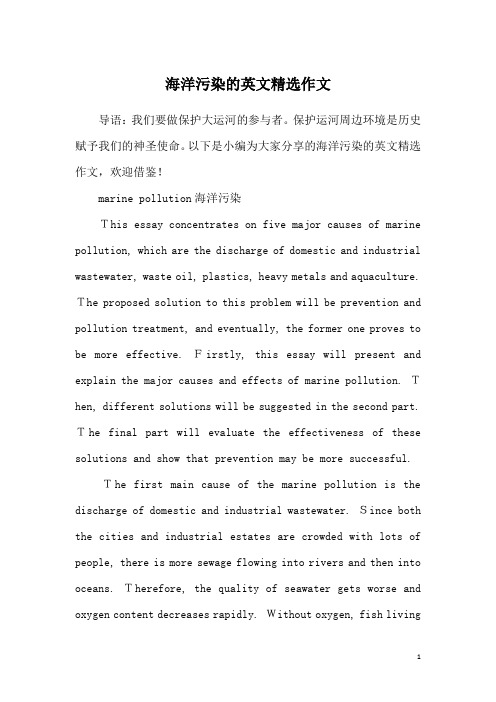
海洋污染的英文精选作文导语:我们要做保护大运河的参与者。
保护运河周边环境是历史赋予我们的神圣使命。
以下是小编为大家分享的海洋污染的英文精选作文,欢迎借鉴!marine pollution海洋污染This essay concentrates on five major causes of marine pollution, which are the discharge of domestic and industrial wastewater, waste oil, plastics, heavy metals and aquaculture. The proposed solution to this problem will be prevention and pollution treatment, and eventually, the former one proves to be more effective. Firstly, this essay will present and explain the major causes and effects of marine pollution. Then, different solutions will be suggested in the second part. The final part will evaluate the effectiveness of these solutions and show that prevention may be more successful.The first main cause of the marine pollution is the discharge of domestic and industrial wastewater. Since both the cities and industrial estates are crowded with lots of people, there is more sewage flowing into rivers and then into oceans. Therefore, the quality of seawater gets worse and oxygen content decreases rapidly. Without oxygen, fish livingunder the sea can not survive. Because of the nutrients in the sewage, seaweed may grow well firstly and eventually die when running out of food. So the wastewater will finally destroy ecological balance for the reason of the discharge of domestic and industrial wastewater.Then waste oil is another significant cause of marine pollution. After leaking from ships, or spilling in accidents, or flowing out of factories, waste oil enters oceans. The total amount of waste oil is surprisingly great. Then the waste oil floats on the water and drifts with winds for it is lighter than water. Several elements in the waste oil are harmful to the living of creatures, especially to the living of seabirds. The oil sticks to the wings of seabirds so they can not fly and die on the sea one after another. It is also poisonous for fish and sea plants. So it is obvious that waste oil may letmany creatures to run into danger of dying out.The third major cause of marine pollution is plastics. Plastics are the main solid pollutants and people treat the oceans like a giant dustbin to pour plastics in. Kusui and Noda’s research showed that in the seashore of Japan, if there are 100 waste items thrown by people, 73 items are plastics,and the plastic litter equals 53.8% of the total litter of wastes. In the neighbouring Russia, the statistics are 55 items and 23.4% respectively (Islam, 20XX).[1] The plastics can block the propeller of ships, and may cause enormous accident. Plastics floating in the oceans can also cause lack of oxygen and have the similar effects, preventing respiration of creatures, as the sewage does. When the plastics break down in the oceans, they can be toxic to marine plants and animals. Therefore, plastics are not only harmful to ships sailing in the oceans and mankind, but also to other creatures living in the seas.Heavy metals are the fourth main cause of the environment problem. There are various sorts of heavy metals contained in water from factories. They go into the oceans through rivers or water run-off. Then they are eaten by fish and begin to accumulate in their bodies. When these fish are caught by us human beings, heavy metals enter our bodies and make us ill. Heavy metals can cause serious diseases.Aquaculture is the final major cause to marine pollution. People usually cultivate fish and other marine life for food. But the foods which they use to feed marine life consequently harm the marine environment where there are people live around.It is because these foods are organic matter and will become rotten in the oceans gradually. The quality of seawater is reduced by this kind of substance and the marine life living in this ocean area and adjacent ocean area will die. Thus, aquaculture will cause harm to the quality of seawater of large areas of oceans.There are two main solutions to the marine pollution problem. Prevention comes out first. It is suggested that governments should perfect new intendance system of protecting the quality of water that we should make water completely clean before it is discharged to the oceans. It is also necessary to establish laws to keep the conduct of people and enterprises, and develop cooperation among different countries. The second main solution is pollution treatment, which contains setting up treatment plants and planting trees. In Kocasoy, Mutlu, and Alag?z’s study (20XX), [2] these solutions can reduce the discharge of domestic and industrial wastewater as well as improve the quality of seawater. Since trees are able to make soil secure and hold back water from running off, they can be planted in the crowded cities and factories which cause marine pollution. Treatment plants are used to cleanse the seawater.Considering the advantages and disadvantages of the twosolutions, prevention of marine pollution will be more effective to solve the problem. In one hand, prevention is the most essential theme of environmental management. The monitoring of water quality can be put into practice in advance to prevent damage to ocean environment. To improve attitudes of people and enterprises towards pollution will obviously be helpful and it is feasible to bringing these limits to maintain the marine environment in good condition. In the other hand, always firstly polluting the marine environment and then taking counter-measures as treatment is irresponsible behaviour. Although these measures can reduce pollution to some extent, the disastrousconsequences may have already existed, and marine pollution will continually come into being and never end. Consequently, prevention is much better in solving the pollution problem.This essay considers the main causes and effects of marine pollution. The five causes are the discharge of domestic and industrial wastewater, waste oil, plastics, heavy metals and aquaculture. They can destroy the ecological balance, endanger many creatures of dying out, harm ships, human beings and other creatures, cause serious diseases to mankind, andcause harm to the quality of seawater of large areas of oceans. The solutions are prevention and pollution treatment. The prevention of marine pollution is proved to be more effective than pollution treatment because it can basically solve this problem and maintain the marine environment in a good condition. In my opinion, it is a challenge for governments to take proper measures to prevent people continuing polluting behaviour. However, there is still a long way to go in the future.。
高一英语作文海洋污染
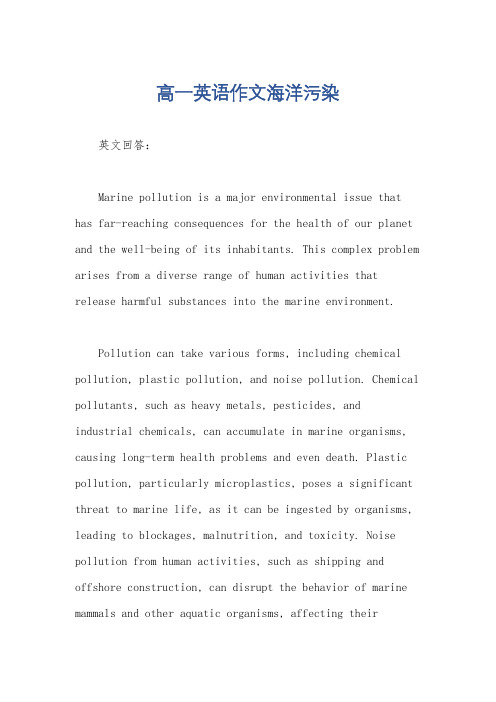
高一英语作文海洋污染英文回答:Marine pollution is a major environmental issue that has far-reaching consequences for the health of our planet and the well-being of its inhabitants. This complex problem arises from a diverse range of human activities that release harmful substances into the marine environment.Pollution can take various forms, including chemical pollution, plastic pollution, and noise pollution. Chemical pollutants, such as heavy metals, pesticides, andindustrial chemicals, can accumulate in marine organisms, causing long-term health problems and even death. Plastic pollution, particularly microplastics, poses a significant threat to marine life, as it can be ingested by organisms, leading to blockages, malnutrition, and toxicity. Noise pollution from human activities, such as shipping and offshore construction, can disrupt the behavior of marine mammals and other aquatic organisms, affecting theircommunication, reproduction, and survival.The impacts of marine pollution are far-reaching and extend beyond individual organisms. Polluted marine environments can lead to declines in biodiversity, damage to marine ecosystems, and loss of habitat. The accumulation of toxins in the food chain poses risks to human health. Furthermore, marine pollution can impact coastal economies, particularly those reliant on fisheries and tourism, and it can also decrease the aesthetic value of coastal areas.Addressing marine pollution requires a multifaceted approach that involves international cooperation, strict regulations, and public awareness campaigns. Governments must implement and enforce strict regulations to control pollution from industrial, agricultural, and shipping activities. International agreements, such as the United Nations' Sustainable Development Goal 14, which aims to conserve and sustainably use the oceans, are crucial for coordinating efforts on a global scale.Raising public awareness is vital in fostering societalchange and promoting responsible behavior. Education campaigns can inform individuals about the sources and impacts of marine pollution and empower them to make sustainable choices in their daily lives. Reducing single-use plastics, adopting eco-friendly cleaning practices, and advocating for responsible waste management are some of the ways individuals can contribute to mitigating marine pollution.By implementing comprehensive solutions and fostering collective action, we can protect our oceans from further degradation and ensure the well-being of marine life and future generations.中文回答:海洋污染。
海洋污染英语作文
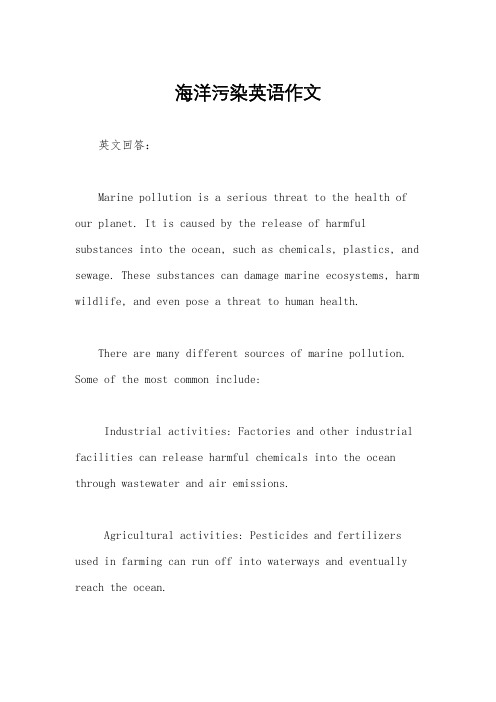
海洋污染英语作文英文回答:Marine pollution is a serious threat to the health of our planet. It is caused by the release of harmful substances into the ocean, such as chemicals, plastics, and sewage. These substances can damage marine ecosystems, harm wildlife, and even pose a threat to human health.There are many different sources of marine pollution. Some of the most common include:Industrial activities: Factories and other industrial facilities can release harmful chemicals into the ocean through wastewater and air emissions.Agricultural activities: Pesticides and fertilizers used in farming can run off into waterways and eventually reach the ocean.Sewage and wastewater: Untreated sewage and wastewater can contain harmful bacteria and viruses that can contaminate the ocean and cause disease.Plastic pollution: Plastic is a major problem for marine pollution. It can entangle wildlife, block digestive tracts, and leach harmful chemicals into the water.Oil spills: Oil spills can release large amounts ofoil into the ocean, which can kill marine life and damage coastal habitats.Marine pollution has a devastating impact on the environment. It can:Harm marine life: Marine pollution can kill marine animals, damage their habitats, and disrupt their food chains.Contaminate seafood: Marine pollution can contaminate seafood, making it unsafe to eat.Damage coastal ecosystems: Marine pollution can damage coastal ecosystems, such as coral reefs and mangrove forests, which provide important habitat for marine life.Pose a threat to human health: Marine pollution can pose a threat to human health through the consumption of contaminated seafood and exposure to harmful chemicals.There are many things that can be done to reduce marine pollution. Some of the most important include:Reducing the use of plastics: One of the best ways to reduce marine pollution is to reduce the use of plastics. This can be done by using reusable bags, avoiding single-use plastics, and recycling plastic products.Properly disposing of sewage and wastewater: Sewageand wastewater should be properly treated before being released into the environment. This can help to remove harmful bacteria and viruses that can contaminate the ocean.Reducing the use of pesticides and fertilizers:Pesticides and fertilizers should be used in a responsible manner to minimize runoff into waterways.Regulating industrial activities: Industrialactivities should be regulated to ensure that they do not release harmful chemicals into the ocean.Cleaning up oil spills: Oil spills should be cleaned up as quickly as possible to minimize the damage to marine life and coastal ecosystems.Marine pollution is a serious problem, but it is one that can be solved. By taking steps to reduce our impact on the ocean, we can help to protect this vital resource for future generations.中文回答:海洋污染是危害我们地球健康的严重威胁。
英语海洋污染的危害作文
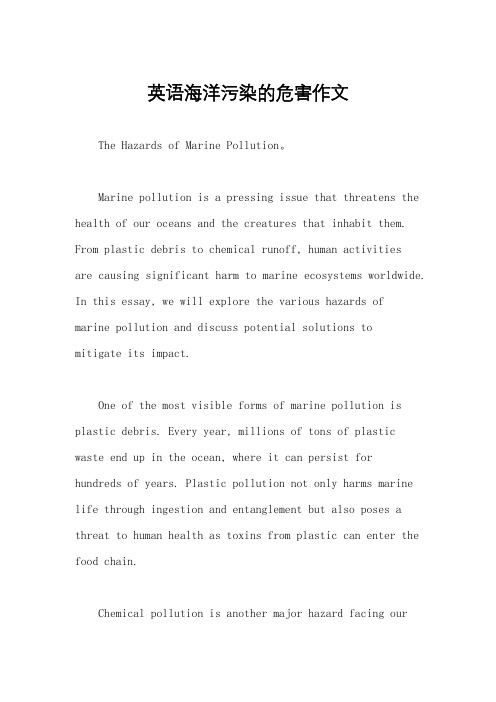
英语海洋污染的危害作文The Hazards of Marine Pollution。
Marine pollution is a pressing issue that threatens the health of our oceans and the creatures that inhabit them. From plastic debris to chemical runoff, human activitiesare causing significant harm to marine ecosystems worldwide. In this essay, we will explore the various hazards ofmarine pollution and discuss potential solutions tomitigate its impact.One of the most visible forms of marine pollution is plastic debris. Every year, millions of tons of plastic waste end up in the ocean, where it can persist for hundreds of years. Plastic pollution not only harms marine life through ingestion and entanglement but also poses a threat to human health as toxins from plastic can enter the food chain.Chemical pollution is another major hazard facing ouroceans. Agricultural runoff, industrial discharge, and oil spills introduce a wide range of toxic substances into marine environments. These pollutants can accumulate in the tissues of marine organisms, leading to harmful effects on reproduction, growth, and immune function. Moreover, chemical pollution can contaminate seafood consumed by humans, posing serious health risks.Furthermore, nutrient pollution, primarily from agricultural fertilizers and sewage discharge, can lead to harmful algal blooms. These blooms deplete oxygen levels in the water, creating dead zones where marine life cannot survive. In addition to causing mass die-offs of fish and other organisms, nutrient pollution can disrupt entire ecosystems, leading to long-term consequences for biodiversity and ecosystem services.Climate change exacerbates the impacts of marine pollution by altering ocean temperatures, acidity levels, and circulation patterns. Rising temperatures can increase the frequency and intensity of coral bleaching events, while ocean acidification threatens the survival of shell-forming organisms such as corals, mollusks, and plankton. Changes in ocean circulation can also affect thedistribution of pollutants, leading to unpredictable ecological effects.Despite the severity of the problem, there is hope for addressing marine pollution through collective action and innovative solutions. Governments can enact and enforce stricter regulations on waste disposal, chemical use, and fishing practices to reduce pollution at its source. Furthermore, investments in waste management infrastructure and public education campaigns can help raise awareness and promote responsible behavior among individuals and industries.Innovations in technology offer promising opportunities for tackling marine pollution. Biodegradable alternatives to single-use plastics, such as compostable packaging and plant-based polymers, can help reduce plastic waste in the ocean. Advanced filtration systems and treatment technologies can remove pollutants from wastewater beforeit is discharged into marine environments. Additionally,remote sensing and monitoring tools enable scientists to track pollution hotspots and assess the effectiveness of conservation efforts.International cooperation is essential for addressing marine pollution on a global scale. Through initiatives such as the United Nations Environment Programme (UNEP) and the International Maritime Organization (IMO), countries can collaborate to develop comprehensive strategies for protecting marine ecosystems and promoting sustainable use of ocean resources. By sharing knowledge, resources, and best practices, we can work together to safeguard the health and vitality of our oceans for future generations.In conclusion, marine pollution poses significant hazards to marine ecosystems, human health, and the global economy. Plastic debris, chemical runoff, nutrient pollution, and climate change threaten the health and vitality of our oceans, with far-reaching consequences for biodiversity and ecosystem services. However, by taking collective action, implementing innovative solutions, and promoting international cooperation, we can address theroot causes of marine pollution and ensure a sustainable future for our oceans.。
海洋的污染英语作文
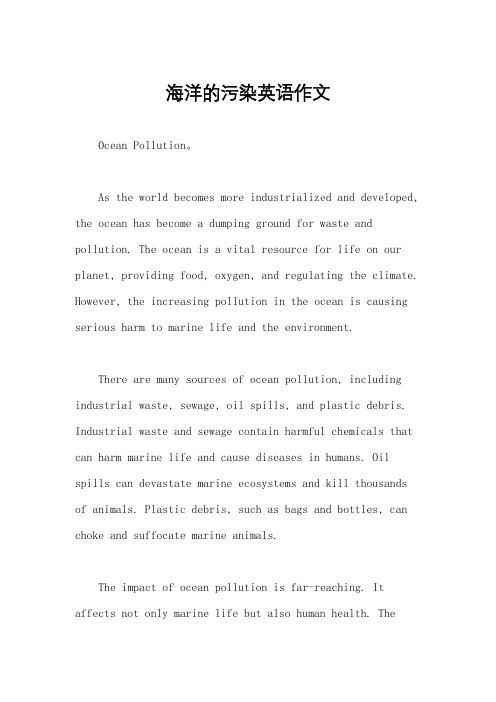
海洋的污染英语作文Ocean Pollution。
As the world becomes more industrialized and developed, the ocean has become a dumping ground for waste and pollution. The ocean is a vital resource for life on our planet, providing food, oxygen, and regulating the climate. However, the increasing pollution in the ocean is causing serious harm to marine life and the environment.There are many sources of ocean pollution, including industrial waste, sewage, oil spills, and plastic debris. Industrial waste and sewage contain harmful chemicals that can harm marine life and cause diseases in humans. Oil spills can devastate marine ecosystems and kill thousands of animals. Plastic debris, such as bags and bottles, can choke and suffocate marine animals.The impact of ocean pollution is far-reaching. It affects not only marine life but also human health. Thechemicals and toxins in the ocean can contaminate the fish and seafood we eat, leading to serious health problems. The plastic debris in the ocean can also end up in our food chain, as fish and other marine animals mistake it for food.To address the issue of ocean pollution, we need totake action on multiple fronts. Governments must regulate and enforce laws to prevent industrial waste and sewagefrom entering the ocean. Oil spills must be prevented through stricter regulations and better safety measures. Individuals can also make a difference by reducing theiruse of plastic and properly disposing of waste.In conclusion, ocean pollution is a serious problemthat requires immediate action. We must take steps toreduce pollution and protect the ocean for future generations. By working together, we can ensure that the ocean remains a vital resource for life on our planet.。
海洋的污染英语作文
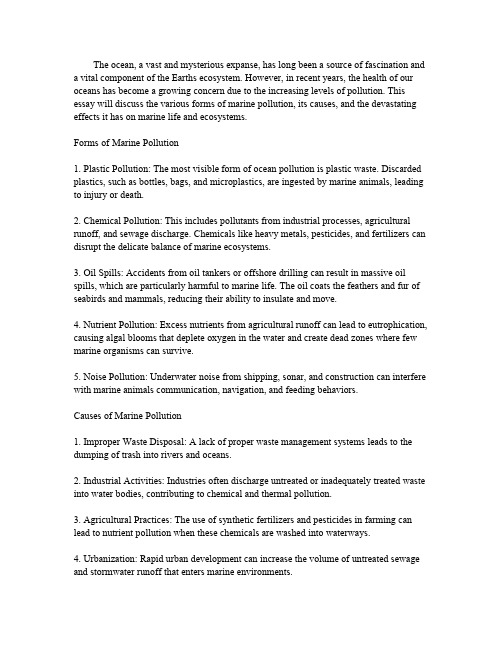
The ocean,a vast and mysterious expanse,has long been a source of fascination and a vital component of the Earths ecosystem.However,in recent years,the health of our oceans has become a growing concern due to the increasing levels of pollution.This essay will discuss the various forms of marine pollution,its causes,and the devastating effects it has on marine life and ecosystems.Forms of Marine Pollution1.Plastic Pollution:The most visible form of ocean pollution is plastic waste.Discarded plastics,such as bottles,bags,and microplastics,are ingested by marine animals,leading to injury or death.2.Chemical Pollution:This includes pollutants from industrial processes,agricultural runoff,and sewage discharge.Chemicals like heavy metals,pesticides,and fertilizers can disrupt the delicate balance of marine ecosystems.3.Oil Spills:Accidents from oil tankers or offshore drilling can result in massive oil spills,which are particularly harmful to marine life.The oil coats the feathers and fur of seabirds and mammals,reducing their ability to insulate and move.4.Nutrient Pollution:Excess nutrients from agricultural runoff can lead to eutrophication, causing algal blooms that deplete oxygen in the water and create dead zones where few marine organisms can survive.5.Noise Pollution:Underwater noise from shipping,sonar,and construction can interfere with marine animals communication,navigation,and feeding behaviors.Causes of Marine Pollution1.Improper Waste Disposal:A lack of proper waste management systems leads to the dumping of trash into rivers and oceans.2.Industrial Activities:Industries often discharge untreated or inadequately treated waste into water bodies,contributing to chemical and thermal pollution.3.Agricultural Practices:The use of synthetic fertilizers and pesticides in farming can lead to nutrient pollution when these chemicals are washed into waterways.4.Urbanization:Rapid urban development can increase the volume of untreated sewage and stormwater runoff that enters marine environments.5.Fishing Activities:Discarded fishing gear and nets,known as ghost nets,continue to trap and kill marine animals long after they have been abandoned.Effects of Marine Pollution1.Loss of Biodiversity:Pollution can lead to the death of marine species,disrupting the food chain and reducing biodiversity.2.Habitat Destruction:Coral reefs,mangroves,and seagrass beds are sensitive ecosystems that can be severely damaged by pollution.3.Human Health Risks:Polluted seafood can pose health risks to humans,including exposure to toxins and pathogens.4.Economic Impact:Marine pollution can harm industries such as tourism and fishing, which rely on clean and healthy marine environments.5.Climate Change:Ocean pollution,particularly from greenhouse gases,contributes to climate change,which in turn affects ocean temperatures and acidity levels.ConclusionThe pollution of our oceans is a pressing issue that requires immediate action.It is crucial to implement stricter regulations on waste disposal,promote sustainable practices in agriculture and industry,and invest in technologies that can mitigate the effects of pollution.Public awareness campaigns can also play a significant role in encouraging individuals to reduce their environmental footprint.By working together,we can protect our oceans and preserve them for future generations.。
海洋污染-英语作文
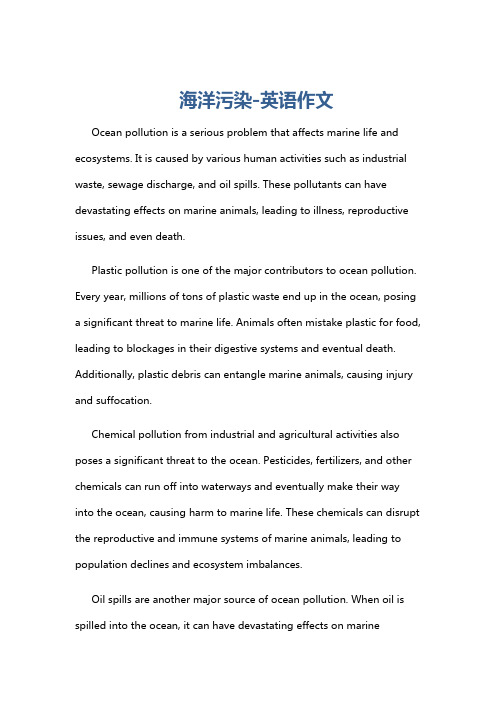
海洋污染-英语作文Ocean pollution is a serious problem that affects marine life and ecosystems. It is caused by various human activities such as industrial waste, sewage discharge, and oil spills. These pollutants can have devastating effects on marine animals, leading to illness, reproductive issues, and even death.Plastic pollution is one of the major contributors to ocean pollution. Every year, millions of tons of plastic waste end up in the ocean, posing a significant threat to marine life. Animals often mistake plastic for food, leading to blockages in their digestive systems and eventual death. Additionally, plastic debris can entangle marine animals, causing injury and suffocation.Chemical pollution from industrial and agricultural activities also poses a significant threat to the ocean. Pesticides, fertilizers, and other chemicals can run off into waterways and eventually make their way into the ocean, causing harm to marine life. These chemicals can disrupt the reproductive and immune systems of marine animals, leading to population declines and ecosystem imbalances.Oil spills are another major source of ocean pollution. When oil is spilled into the ocean, it can have devastating effects on marineecosystems. Oil coats the feathers of seabirds, making it difficult for them to fly and stay warm. It can also suffocate marine animals such as fish and invertebrates. The long-term effects of oil spills can be catastrophic, leading to declines in populations and long-lasting damage to the environment.In conclusion, ocean pollution is a serious and complex issue that requires immediate attention. It is essential for individuals, communities, and governments to take action to reduce the amount of pollution entering the ocean. By implementing stricter regulations, promoting recycling and waste reduction, and supporting conservation efforts, we can work towards a cleaner and healthier ocean for future generations.。
海洋受污染的现状英语作文
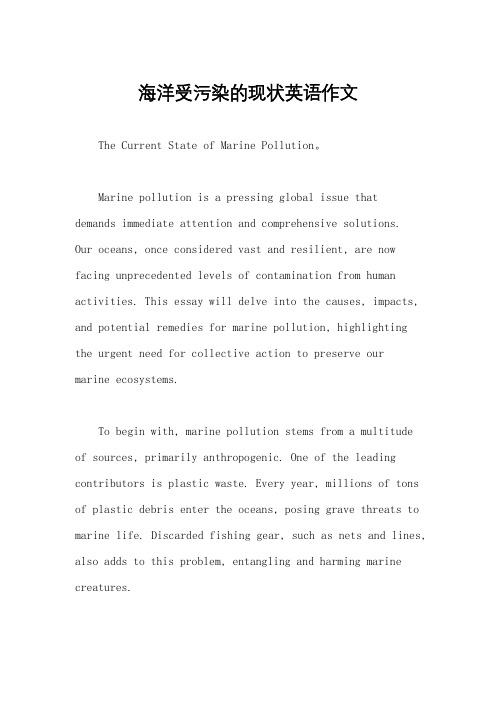
海洋受污染的现状英语作文The Current State of Marine Pollution。
Marine pollution is a pressing global issue that demands immediate attention and comprehensive solutions.Our oceans, once considered vast and resilient, are now facing unprecedented levels of contamination from human activities. This essay will delve into the causes, impacts, and potential remedies for marine pollution, highlighting the urgent need for collective action to preserve ourmarine ecosystems.To begin with, marine pollution stems from a multitudeof sources, primarily anthropogenic. One of the leading contributors is plastic waste. Every year, millions of tons of plastic debris enter the oceans, posing grave threats to marine life. Discarded fishing gear, such as nets and lines, also adds to this problem, entangling and harming marine creatures.Moreover, industrial activities discharge toxic chemicals and heavy metals directly into coastal waters, contaminating marine habitats and endangering marine species. Agricultural runoff, carrying pesticides and fertilizers, further exacerbates this issue by causing harmful algal blooms and oxygen-depleted "dead zones."Oil spills are another significant cause of marine pollution, with catastrophic consequences for marine ecosystems. Accidental oil discharges from shipping accidents or offshore drilling operations can devastate coastlines, killing marine life and disrupting entire ecosystems.The impacts of marine pollution are wide-ranging and severe. Plastic waste, for instance, accumulates in massive garbage patches, such as the Great Pacific Garbage Patch, which not only harm marine life but also degrade water quality. Marine animals often mistake plastic debris for food, leading to internal injuries, starvation, and death. Additionally, toxins from pollutants can accumulate in the tissues of marine organisms, ultimately entering the humanfood chain through seafood consumption.Furthermore, marine pollution poses economic challenges, particularly for industries reliant on healthy oceans. Coastal tourism suffers from polluted beaches, while fisheries face declining stocks due to habitat degradation and species loss. The long-term consequences of marine pollution could jeopardize food security and livelihoodsfor millions of people worldwide.Addressing marine pollution requires a multi-faceted approach involving governments, industries, communities,and individuals. Strict regulations are needed to limit industrial discharges and control waste disposal practices. International agreements like the MARPOL Convention play a crucial role in regulating maritime pollution and promoting best practices in shipping.Moreover, public awareness and education campaigns are essential to change individual behaviors and reduce plastic consumption. Efforts to promote recycling, beach clean-ups, and sustainable fishing practices can contribute tomitigating marine pollution at the grassroots level.Innovative technologies also hold promise in combating marine pollution. For instance, advanced waste management systems can effectively process plastic waste before it reaches the oceans. Similarly, research into biodegradable materials and alternative packaging could help reduce the reliance on conventional plastics.Lastly, restoration efforts are vital forrehabilitating degraded marine habitats. Programs aimed at restoring coastal wetlands, mangroves, and coral reefs can enhance resilience against pollution and support marine biodiversity recovery.In conclusion, marine pollution is a complex environmental challenge with far-reaching consequences for ecosystems and human well-being. Urgent action is requiredat all levels to curb pollution sources, promotesustainable practices, and restore the health of our oceans. Only through concerted efforts can we ensure the long-termhealth and vitality of marine environments for future generations.。
海洋污染英语作文80词
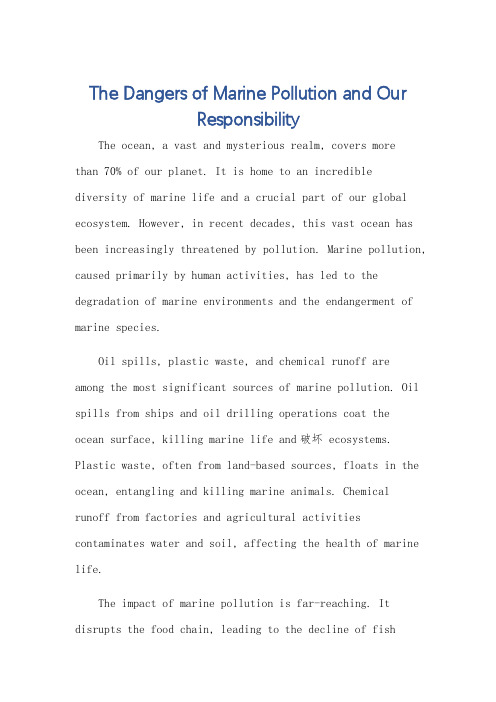
The Dangers of Marine Pollution and OurResponsibilityThe ocean, a vast and mysterious realm, covers morethan 70% of our planet. It is home to an incrediblediversity of marine life and a crucial part of our global ecosystem. However, in recent decades, this vast ocean has been increasingly threatened by pollution. Marine pollution, caused primarily by human activities, has led to the degradation of marine environments and the endangerment of marine species.Oil spills, plastic waste, and chemical runoff are among the most significant sources of marine pollution. Oil spills from ships and oil drilling operations coat theocean surface, killing marine life and破坏 ecosystems. Plastic waste, often from land-based sources, floats in the ocean, entangling and killing marine animals. Chemicalrunoff from factories and agricultural activities contaminates water and soil, affecting the health of marine life.The impact of marine pollution is far-reaching. It disrupts the food chain, leading to the decline of fishstocks and affecting human food security. It also destroys habitats, forcing marine animals to migrate or face extinction. Furthermore, marine pollution poses a threat to human health, as contaminated seafood can transmit diseases and toxins to humans.As individuals, we have a responsibility to protect our oceans. We can reduce the use of single-use plastics, support sustainable fishing practices, and promote awareness about the dangers of marine pollution. Governments and international organizations must also take action, implementing strict regulations on pollution and promoting sustainable development.In conclusion, marine pollution is a serious threat to our planet's health and biodiversity. It is essential that we take action to protect our oceans, ensuring asustainable future for ourselves and all marine life.**海洋污染的危害与我们的责任**海洋,这个广阔而神秘的领域,覆盖了地球超过70%的面积。
海洋污染的英语作文

海洋污染的英语作文Ocean pollution is a serious issue that is affecting marine life all around the world. From plastic waste to oil spills, our oceans are being contaminated in various ways. It's time for us to take action and protect our oceans before it's too late.The sight of a beautiful beach covered in trash is a heartbreaking reminder of the impact of human activity on the environment. Plastic bottles, bags, and other debris can harm marine animals and disrupt the delicate balance of the ecosystem. We need to reduce our use of single-use plastics and properly dispose of waste to prevent further pollution.Oil spills are another major source of ocean pollution, causing devastating effects on marine life and coastal communities. The toxic chemicals in oil can suffocate marine animals and contaminate their habitats. It's essential for companies to prioritize safety measures andinvest in clean energy alternatives to prevent future disasters.Chemical pollution from agricultural runoff and industrial waste also poses a threat to the health of our oceans. Pesticides, fertilizers, and other harmful substances can lead to algal blooms, dead zones, and the destruction of coral reefs. We must regulate the use of these chemicals and implement sustainable practices to protect our oceans for future generations.The impact of ocean pollution extends beyond marine life, affecting human health and livelihoods as well. Contaminated seafood can pose health risks to consumers, while polluted waters can harm local economies that rely on fishing and tourism. By addressing the root causes of pollution and promoting conservation efforts, we can safeguard both the environment and our own well-being.In conclusion, ocean pollution is a pressing issue that requires immediate attention and collective action. We must work together to reduce plastic waste, prevent oil spills,and mitigate chemical pollution to protect the health and diversity of our oceans. Let's strive to be better stewards of the environment and make a positive impact on the world around us.。
海洋污染的英语作文
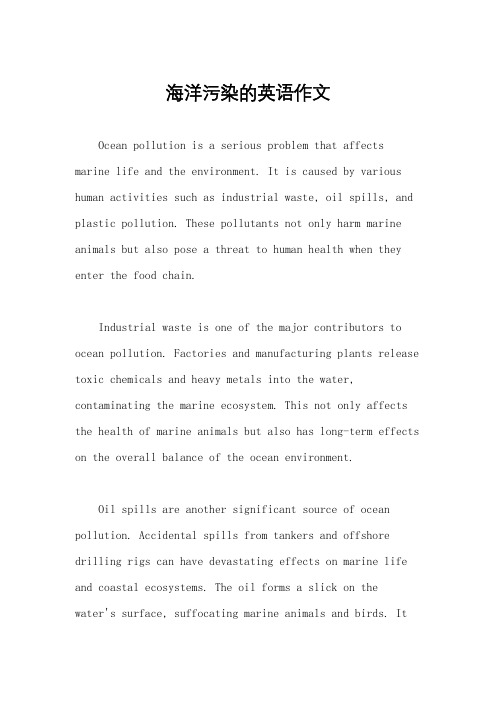
海洋污染的英语作文Ocean pollution is a serious problem that affects marine life and the environment. It is caused by various human activities such as industrial waste, oil spills, and plastic pollution. These pollutants not only harm marine animals but also pose a threat to human health when they enter the food chain.Industrial waste is one of the major contributors to ocean pollution. Factories and manufacturing plants release toxic chemicals and heavy metals into the water, contaminating the marine ecosystem. This not only affects the health of marine animals but also has long-term effects on the overall balance of the ocean environment.Oil spills are another significant source of ocean pollution. Accidental spills from tankers and offshore drilling rigs can have devastating effects on marine life and coastal ecosystems. The oil forms a slick on thewater's surface, suffocating marine animals and birds. Italso seeps into the ocean floor, causing long-term damageto the marine environment.Plastic pollution is a growing concern for the world's oceans. Single-use plastics such as bags, bottles, and straws are often discarded and end up in the ocean, where they break down into tiny particles known as microplastics. These microplastics are ingested by marine animals, causing harm to their digestive systems and potentially enteringthe human food chain.The impact of ocean pollution is far-reaching and requires immediate action to address. Governments, industries, and individuals all have a role to play in reducing pollution and protecting the oceans. This can be done through stricter regulations on industrial waste disposal, investing in clean energy alternatives, and reducing the use of single-use plastics through recycling and sustainable practices.In conclusion, ocean pollution is a pressing issue that requires collective effort to address. By raising awareness,implementing stricter regulations, and adopting sustainable practices, we can work towards a cleaner and healthier marine environment for future generations.。
海洋污染 英语作文
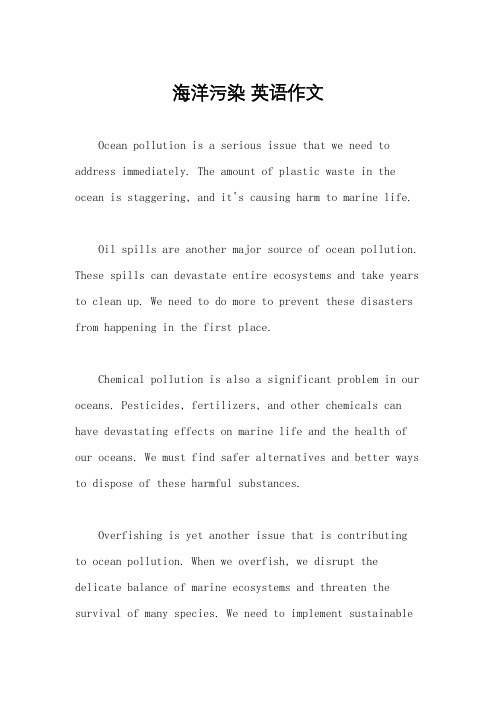
海洋污染英语作文Ocean pollution is a serious issue that we need to address immediately. The amount of plastic waste in the ocean is staggering, and it's causing harm to marine life.Oil spills are another major source of ocean pollution. These spills can devastate entire ecosystems and take years to clean up. We need to do more to prevent these disasters from happening in the first place.Chemical pollution is also a significant problem in our oceans. Pesticides, fertilizers, and other chemicals can have devastating effects on marine life and the health of our oceans. We must find safer alternatives and better ways to dispose of these harmful substances.Overfishing is yet another issue that is contributing to ocean pollution. When we overfish, we disrupt the delicate balance of marine ecosystems and threaten the survival of many species. We need to implement sustainablefishing practices to protect our oceans for future generations.In conclusion, ocean pollution is a complex and urgent problem that requires immediate action. We must all do our part to reduce our impact on the oceans and work together to find solutions to this critical issue. Our oceans are precious and vital to life on Earth, and we must do everything we can to protect them.。
有关海洋污染的英语作文六年级
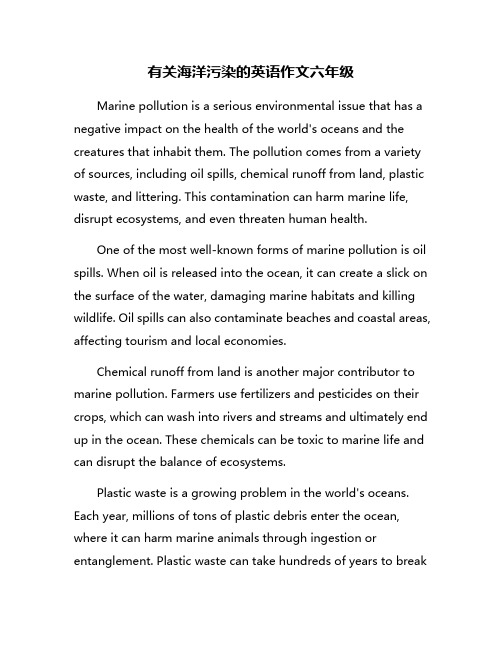
有关海洋污染的英语作文六年级Marine pollution is a serious environmental issue that has a negative impact on the health of the world's oceans and the creatures that inhabit them. The pollution comes from a variety of sources, including oil spills, chemical runoff from land, plastic waste, and littering. This contamination can harm marine life, disrupt ecosystems, and even threaten human health.One of the most well-known forms of marine pollution is oil spills. When oil is released into the ocean, it can create a slick on the surface of the water, damaging marine habitats and killing wildlife. Oil spills can also contaminate beaches and coastal areas, affecting tourism and local economies.Chemical runoff from land is another major contributor to marine pollution. Farmers use fertilizers and pesticides on their crops, which can wash into rivers and streams and ultimately end up in the ocean. These chemicals can be toxic to marine life and can disrupt the balance of ecosystems.Plastic waste is a growing problem in the world's oceans. Each year, millions of tons of plastic debris enter the ocean, where it can harm marine animals through ingestion or entanglement. Plastic waste can take hundreds of years to breakdown, so it remains in the environment for a long time, causing ongoing harm.Littering is a common cause of marine pollution as well. Trash left on beaches or thrown overboard from boats can end up in the ocean, where it can harm marine life and spoil the beauty of the ocean. Cigarette butts, plastic bags, and fishing gear are some of the most common types of litter found in the ocean.The consequences of marine pollution are far-reaching. It can harm marine animals by causing illness, injury, or death. Polluted water can also make seafood unsafe for humans to eat, putting public health at risk. In addition, marine pollution can damage coral reefs, seagrass beds, and other vital habitats, leading to a loss of biodiversity.Fortunately, there are steps that individuals and governments can take to reduce marine pollution. One of the most effective strategies is to properly dispose of trash and recycling, rather than littering or dumping waste into the ocean. Recycling plastic bottles, bags, and other items can help reduce the amount of plastic waste that ends up in the ocean.Governments can also implement regulations to limit the release of pollutants into the ocean. Laws restricting the use ofharmful chemicals, such as pesticides and fertilizers, can help protect marine ecosystems. In addition, fines and penalties for oil spills and other forms of pollution can deter companies from engaging in harmful practices.Education and awareness are also important tools in the fight against marine pollution. By educating the public about the impacts of pollution on the ocean and marine life, individuals can make better choices about how they dispose of waste and use resources. Schools, community groups, and environmental organizations can all play a role in spreading awareness about this critical issue.In conclusion, marine pollution is a significant threat to the health of the world's oceans and the creatures that depend on them. By taking action to reduce pollution and protect marine ecosystems, we can help ensure a healthy and thriving ocean for future generations. By working together, we can make a difference and safeguard the beauty and diversity of the ocean for years to come.。
海洋的污染英语作文
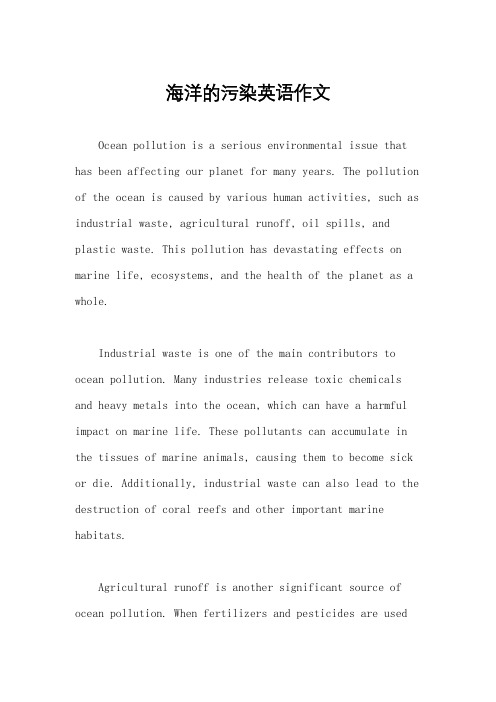
海洋的污染英语作文Ocean pollution is a serious environmental issue that has been affecting our planet for many years. The pollution of the ocean is caused by various human activities, such as industrial waste, agricultural runoff, oil spills, and plastic waste. This pollution has devastating effects on marine life, ecosystems, and the health of the planet as a whole.Industrial waste is one of the main contributors to ocean pollution. Many industries release toxic chemicals and heavy metals into the ocean, which can have a harmful impact on marine life. These pollutants can accumulate in the tissues of marine animals, causing them to become sick or die. Additionally, industrial waste can also lead to the destruction of coral reefs and other important marine habitats.Agricultural runoff is another significant source of ocean pollution. When fertilizers and pesticides are usedin agriculture, they can run off into nearby waterways and eventually make their way into the ocean. This can lead to the growth of harmful algal blooms, which can deplete oxygen levels in the water and create dead zones where marine life cannot survive. Additionally, agriculturalrunoff can also lead to the contamination of seafood, making it unsafe for human consumption.Oil spills are a well-known cause of ocean pollution, and they can have devastating effects on marine ecosystems. When oil is spilled into the ocean, it can coat thefeathers of seabirds, clog the gills of fish, and smother marine mammals. Oil spills can also contaminate coastal habitats, such as beaches and marshes, and have long-term effects on the health of these ecosystems.Plastic waste is perhaps the most visible form of ocean pollution, and it is a major threat to marine life. Every year, millions of tons of plastic waste end up in the ocean, where it can harm marine animals in a variety of ways. For example, sea turtles often mistake plastic bags forjellyfish and ingest them, leading to intestinal blockagesand death. Additionally, plastic waste can break down into tiny particles known as microplastics, which can be ingested by a wide range of marine animals and can have harmful effects on their health.In conclusion, ocean pollution is a major environmental issue that is caused by a variety of human activities. It has devastating effects on marine life, ecosystems, and the health of the planet as a whole. In order to address this problem, it is important for individuals, industries, and governments to take action to reduce their impact on the ocean and to work towards sustainable solutions. By working together, we can help to protect the ocean and ensure a healthy future for the planet.。
海洋污染英语作文以第一人称

海洋污染英语作文以第一人称英文回答:Ocean pollution is a serious issue that needs to be addressed immediately. As an individual who loves the ocean and all its inhabitants, I am deeply concerned about the negative impact that pollution is having on our marine ecosystems.One of the main sources of ocean pollution is plastic waste. Every year, millions of tons of plastic end up in the ocean, harming marine life and disrupting the delicate balance of the ecosystem. I remember watching a documentary where they showed a sea turtle with a plastic straw stuckin its nostril, struggling to breathe. It was heart-wrenching to see the pain and suffering that human negligence had caused.Another major contributor to ocean pollution is oil spills. These catastrophic events not only harm marine lifebut also have long-lasting effects on coastal communities.I recall reading about the Exxon Valdez oil spill in 1989, which devastated the local fishing industry in Alaska and took years to clean up. The images of oil-soaked birds and marine mammals still haunt me to this day.In addition to plastic waste and oil spills, chemicals and sewage from industrial and agricultural activities also pose a threat to our oceans. These pollutants can contaminate the water and harm marine life, leading to a decline in biodiversity and ecosystem health. I once went snorkeling in a beautiful coral reef and was shocked to see how much damage pollution had caused. The once vibrant colors were now faded, and many corals were bleached and dying.As an ocean lover, I feel a sense of responsibility to do my part in protecting our oceans. I make a conscious effort to reduce my plastic consumption, recycle whenever possible, and participate in beach clean-up events. I also support organizations that are dedicated to ocean conservation and advocate for stricter regulations onpollution control.In conclusion, ocean pollution is a pressing issue that requires immediate action. We must all work together to reduce our environmental footprint and preserve the beauty and biodiversity of our oceans for future generations.中文回答:海洋污染是一个需要立即解决的严重问题。
- 1、下载文档前请自行甄别文档内容的完整性,平台不提供额外的编辑、内容补充、找答案等附加服务。
- 2、"仅部分预览"的文档,不可在线预览部分如存在完整性等问题,可反馈申请退款(可完整预览的文档不适用该条件!)。
- 3、如文档侵犯您的权益,请联系客服反馈,我们会尽快为您处理(人工客服工作时间:9:00-18:30)。
This essay concentrates on five major causes of marine pollution, which are the discharge of domestic and industrial wastewater, waste oil, plastics, heavy metals and aquaculture. The proposed solution to this problem will be prevention and pollution treatment, and eventually, the former one proves to be more effective. Firstly, this essay will present and explain the major causes and effects of marine pollution. Then, different solutions will be suggested in the second part. The final part will evaluate the effectiveness of these solutions and show that prevention may be more successful.The first main cause of the marine pollution is the discharge of domestic and industrial wastewater. Since both the cities and industrial estates are crowded with lots of people, there is more sewage flowing into rivers and then into oceans. Therefore, the quality of seawater gets worse and oxygen content decreases rapidly. Without oxygen, fish living under the sea can not survive. Because of the nutrients in the sewage, seaweed may grow well firstly and eventually die when running out of food. So the wastewater will finally destroy ecological balance for the reason of the discharge of domestic and industrial wastewater.Then waste oil is another significant cause of marine pollution. After leaking from ships, or spilling in accidents, or flowing out of factories, waste oil enters oceans. The total amount of waste oil is surprisingly great. Then the waste oil floats on the water and drifts with winds for it is lighter than water. Several elements in the waste oil are harmful to the living of creatures, especially to the living of seabirds. The oil sticks to the wings of seabirds so they can not fly and die on the sea one after another. It is also poisonous for fish and sea plants. So it is obvious that waste oil may letmany creatures to run into danger of dying out.The third major cause of marine pollution is plastics. Plastics are the main solid pollutants and people treat the oceans like a giant dustbin to pour plastics in. Kusui and Noda’s research showed that in the seashore of Japan, if there are 100 waste items thrown by people, 73 items are plastics, and the plastic litter equals 53.8% of the total litter of wastes. In the neighbouring Russia, the statistics are 55 items and 23.4% respectively (Islam, 2004).[1] The plastics can block the propeller of ships, and may cause enormous accident. Plastics floating in the oceans can also cause lack of oxygen and have the similar effects, preventing respiration of creatures, as the sewage does. When the plastics break down in the oceans, they can be toxic to marine plants and animals. Therefore, plastics are not only harmful to ships sailing in the oceans and mankind, but also to other creatures living in the seas.Heavy metals are the fourth main cause of the environment problem. There are various sorts of heavy metals contained in water from factories. They go into the oceans through rivers or water run-off. Then they are eaten by fish and begin to accumulate in their bodies. When these fish are caught by us human beings, heavy metals enter our bodies and make us ill. Heavy metals can cause serious diseases.Aquaculture is the final major cause to marine pollution. People usually cultivate fish and other marine life for food. But the foods which they use to feed marine life consequently harm the marine environment where there are people live around. It is because these foods are organic matter and will become rotten in the oceans gradually. The quality of seawater is reduced by this kind of substance and the marine life livingin this ocean area and adjacent ocean area will die. Thus, aquaculture will cause harm to the quality of seawater of large areas of oceans.There are two main solutions to the marine pollution problem. Prevention comes out first. It is suggested that governments should perfect new intendance system of protecting the quality of water that we should make water completely clean before it is discharged to the oceans. It is also necessary to establish laws to keep the conduct of people and enterprises, and develop cooperation among different countries. The second main solution is pollution treatment, which contains setting up treatment plants and planting trees. In Kocasoy, Mutlu, and Alagöz’s study (2008), [2]these solutions can reduce the discharge of domestic and industrial wastewater as well as improve the quality of seawater. Since trees are able to make soil secure and hold back water from running off, they can be planted in the crowded cities and factories which cause marine pollution. Treatment plants are used to cleanse the seawater.Considering the advantages and disadvantages of the two solutions, prevention of marine pollution will be more effective to solve the problem. In one hand, prevention is the most essential theme of environmental management. The monitoring of water quality can be put into practice in advance to prevent damage to ocean environment. To improve attitudes of people and enterprises towards pollution will obviously be helpful and it is feasible to bringing these limits to maintain the marine environment in good condition. In the other hand, always firstly polluting the marine environment and then taking counter-measures as treatment is irresponsible behaviour. Although these measures can reduce pollution to some extent, the disastrousconsequences may have already existed, and marine pollution will continually come into being and never end. Consequently, prevention is much better in solving the pollution problem.This essay considers the main causes and effects of marine pollution. The five causes are the discharge of domestic and industrial wastewater, waste oil, plastics, heavy metals and aquaculture. They can destroy the ecological balance, endanger many creatures of dying out, harm ships, human beings and other creatures, cause serious diseases to mankind, and cause harm to the quality of seawater of large areas of oceans. The solutions are prevention and pollution treatment. The prevention of marine pollution is proved to be more effective than pollution treatment because it can basically solve this problem and maintain the marine environment in a good condition. In my opinion, it is a challenge for governments to take proper measures to prevent people continuing polluting behaviour. However, there is still a long way to go in the future.(word count = 1151 words)Reference[1] Islam, M. S. & Tanaka, M., (2004) Impacts of pollution on coastal and marine ecosystems including coastal and marine fisheries and approach for management: a review and synthesis. Marine Pollution Bulletin, 48(7-8), P.624-649[2] Kocasoy, G., Mutlu, H. İ., Alagöz B. A. Z., (2008) Prevention of marineenvironment pollution at the tourism regions by the application of a simple method for the domestic wastewater. Desalination, 226(1-3), P.21-37。
